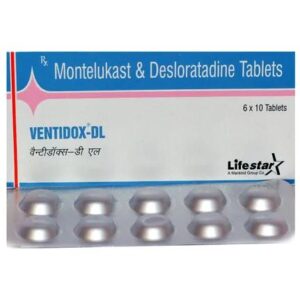MONTELUKAST + DESLORATIDINE
Montelukast: Montelukast, sold under the brand name Singulair, is a medication approved for the treatment of asthma and allergic rhinitis (hay fever). It belongs to a class of drugs called leukotriene receptor antagonists.
The main mechanism of action of montelukast is to block the action of leukotrienes, which are substances in the body that cause inflammation and are involved in the pathogenesis of asthma and allergic rhinitis. By blocking the leukotriene receptors, montelukast helps to prevent the narrowing of airways, reduce inflammation, and improve symptoms such as wheezing, coughing, shortness of breath, and nasal congestion.
Montelukast is available in tablet form to be taken orally. The dosage varies depending on the age and condition being treated. For asthma, the usual recommended dose for adults and adolescents (15 years and older) is 10 mg once daily, while for children (6-14 years) the dose is 5 mg once daily. For allergic rhinitis, the recommended dose for both adults and children (2-14 years) is 10 mg once daily.
As with any medication, montelukast may cause certain side effects. Common side effects include headache, upset stomach, diarrhea, nausea, sore throat, cough, dizziness, and tiredness. In rare cases, it may cause serious psychiatric side effects such as agitation, aggression, depression, hallucinations, and suicidal thoughts. If any of these side effects occur, it is important to seek immediate medical attention.
It is worth noting that while montelukast is generally considered safe and effective, it may not be suitable for everyone. Individuals with a history of liver disease, phenylketonuria, or allergic reactions to any of the components of the medication should use montelukast with caution or avoid it altogether. It is recommended to consult a healthcare professional before starting montelukast to determine the appropriate dosage and to ensure that it is the right medication for the individual’s condition.
Desloratidine: Desloratadine is a medication primarily used to manage allergic rhinitis (hay fever) symptoms such as sneezing, itching, and runny nose. It is also prescribed to relieve symptoms of chronic idiopathic urticaria (hives) including itching and rash. Desloratadine belongs to a class of drugs called antihistamines.
The drug works by blocking the effects of histamine, a substance produced by the body during an allergic reaction. Histamine causes the symptoms associated with allergic reactions, and by blocking its effects, desloratadine helps alleviate these symptoms.
The usual adult dose of desloratadine is 5 mg once daily. However, it is important to follow your doctor’s instructions regarding dosage as it may vary depending on your condition. Desloratadine is available in tablet, oral solution, and orally disintegrating tablet forms.
Common side effects of desloratadine may include drowsiness, dry mouth, sore throat, headache, fatigue, nausea, and stomach pain. It is advisable to avoid driving or operating heavy machinery if you experience drowsiness after taking this medication. Although rare, serious side effects such as fast/irregular heartbeat, difficulty urinating, and allergic reactions may occur. If any severe or persistent side effects occur, it is important to seek medical attention immediately.
It is always recommended to consult with a healthcare professional or pharmacist for accurate and personalized information about the use, dose, and potential side effects of desloratadine based on your specific medical condition and other medications you may be taking.

